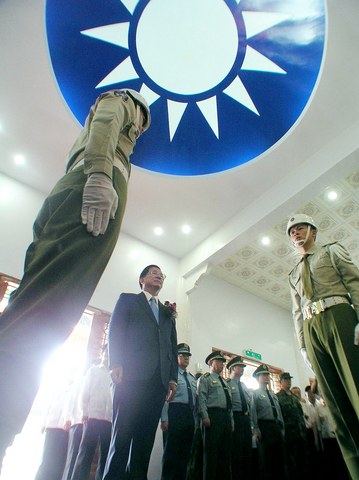President Chen Shui-bian (陳水扁) yesterday said that he expected constructive discussions with Chinese Nationalist Party (KMT) Chairman Ma Ying-jeou (馬英九) on a revised arms-procurement package, as the Ministry of National Defense announced it would redirect items from the bill to its regular budget.
"The special arms budget has been unreasonably blocked by the pan-blue-camp parties on 26 occasions in the legislature. There has been no chance for the arms bill to be discussed in the legislature," Chen said. "But with Ma assuming the KMT chairmanship last week, I expect to have a reasonable and practical discussion on the arms bill and national security issues with Ma as soon as possible."
Chen made the comments during a military ceremony in Kinmen yesterday.

PHOTO: WU CHENG-TING, TAIPEI TIMES
The reallocation of items is an apparent attempt to make the bill more palatable to the pan-blue camp. But Ma yesterday seemed uninterested in Chen's agenda or holding a meeting, and tersely suggested that the arms issue should be dealt with by the caucuses in the legislature.
Presidential Office Secretary-General Yu Shyi-kun then said that Ma should clarify his stance on important bills.
"Arms procurement concerns national security. The responsibility has to be taken by both the government and opposition parties, including the majority [party in the legislature]. In short, everyone must share responsibility, and that includes the KMT chairman," he said.
The defense ministry said it would trim the NT$480 billion (US$15 billion) budget to facilitate its passage through the legislature. Although there would be no change in the weaponry to be bought, part of the special budget would be placed in the regular defense budget, military spokesman Liu Chih-chien (劉志堅) said.
Liu said local reports that the NT$133 billion earmarked for six batteries of PAC-3 missiles would be transferred was one option.
Speaking on Ma's leadership of the KMT, Chen said he expected Ma to take an honest and reasonable approach when negotiating with the government.
"I expect that Ma will avoid partisanship and cooperate with the government in promoting the nation's security," he said.
Chen said Taiwan did not want to be involved in an arms race with China. "Avoiding war" and "stopping war" had been the government's position from the outset, he said.
However, Taiwan had to be prepared for a military attack from China, he said.
"China's more than 700 missiles targeting Taiwan and its introduction of the `Anti-Secession' Law in March legalizing a non-peaceful approach to resolving the Taiwan issue show their intentions," he said.
The original arms bill aimed to purchase three major weapons systems from the US -- eight diesel-electric submarines, 12 P-3C Orion maritime patrol aircraft and PAC-3 Patriot anti-missile batteries.
The delay in approving the arms deal has fueled worries in Washington that Taipei is not serious about its own defense, with some senior US officials calling the budget a litmus test for US-Taiwan relations.
The legislature is set to review the arms budget next month.
Additional reporting by Chiu Yu-tzu
also see story:
KMT willing to review arms plan

Taiwan yesterday denied Chinese allegations that its military was behind a cyberattack on a technology company in Guangzhou, after city authorities issued warrants for 20 suspects. The Guangzhou Municipal Public Security Bureau earlier yesterday issued warrants for 20 people it identified as members of the Information, Communications and Electronic Force Command (ICEFCOM). The bureau alleged they were behind a May 20 cyberattack targeting the backend system of a self-service facility at the company. “ICEFCOM, under Taiwan’s ruling Democratic Progressive Party, directed the illegal attack,” the warrant says. The bureau placed a bounty of 10,000 yuan (US$1,392) on each of the 20 people named in

The High Court yesterday found a New Taipei City woman guilty of charges related to helping Beijing secure surrender agreements from military service members. Lee Huei-hsin (李慧馨) was sentenced to six years and eight months in prison for breaching the National Security Act (國家安全法), making illegal compacts with government employees and bribery, the court said. The verdict is final. Lee, the manager of a temple in the city’s Lujhou District (蘆洲), was accused of arranging for eight service members to make surrender pledges to the Chinese People’s Liberation Army in exchange for money, the court said. The pledges, which required them to provide identification

Nine retired generals from Taiwan, Japan and the US have been invited to participate in a tabletop exercise hosted by the Taipei School of Economics and Political Science Foundation tomorrow and Wednesday that simulates a potential Chinese invasion of Taiwan in 2030, the foundation said yesterday. The five retired Taiwanese generals would include retired admiral Lee Hsi-min (李喜明), joined by retired US Navy admiral Michael Mullen and former chief of staff of the Japan Self-Defense Forces general Shigeru Iwasaki, it said. The simulation aims to offer strategic insights into regional security and peace in the Taiwan Strait, it added. Foundation chair Huang Huang-hsiung

’DISTORTION’: Beijing’s assertion that the US agreed with its position on Taiwan is a recurring tactic it uses to falsely reinforce its sovereignty claims, MOFA said The Ministry of Foreign Affairs (MOFA) yesterday said Chinese state media deliberately distorted Taiwan’s sovereign status, following reports that US President Donald Trump agreed to uphold the “one China” policy in a phone call with Chinese President Xi Jinping (習近平). During the more than one-hour-long call, Xi urged Trump to retreat from trade measures that roiled the global economy and cautioned him against threatening steps on Taiwan, a Chinese government summary of the call said. China’s official Xinhua news agency quoted Xi as saying that the US should handle the Taiwan issue cautiously and avoid the two countries being drawn into dangerous